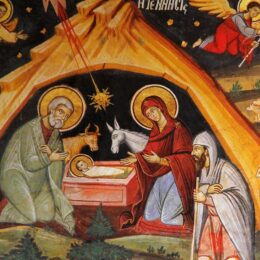January 30, 2005
Feast of the Three Great Hierarchs
Father Pat’s Pastoral Ponderings
Ranking high among the slogans I don’t like is the one that says, “history repeats itself.” I admit history records certain similar and analogous patterns, but strictly speaking it does not “repeat itself.” If it did, it would not be history.
Closer to the truth, but maybe still a bit shy of it, in my opinion, is the much quoted mot of Santayana that those who do not know their history are destined to repeat it. This saying at least has the merit of suggesting that one of the purposes of studying history is to keep us from copying its mistakes. Perhaps it would be a more ample expression of the truth to say that we study history to find out what will work in human life and what won’t.
Like the Hebrews in Holy Scripture, the Greeks of antiquity tried to learn practical lessons from history. Indeed, it was from these two cultural sources that the very concept of “history” made its way into our thinking.
History in this sense differs radically from what is called Natural History, which examines constant, highly predictable patterns in nature. It is really an aspect of natural science. What an animal or plant will do, how it will react to its environment, is absolutely determined by the influences brought to bear upon it. Given the same environment, a bird of a particular species builds her nest always the same way, and a beaver his dam.
A professor of anthropology once told me that animals could think, an assertion strongly hinting that the professor himself could not. At least, his declaration made me certain that he had never reflected on what is really meant by thinking.
It would be remarkable, indeed, if animals really did begin to think. Imagine the scene. The robin, laying hold of the mathematical and engineering complexities involved, suddenly adds some new structural component to her nest–a second storey, perhaps, or central heating. To celebrate the event, the other robins warble a new anthem in four-part harmony. And the beaver, engulfed hitherto in his old cultural backwater, abruptly begins to adorn his dam with statuettes of the great, wise, and heroic beavers of yesteryear. And the cow, fearing to be outdone, forthwith summons a press conference to announce a new space program that would allow her, at long last, to jump over the moon.
If any of these things should happen, then anything at all might happen. As for the little dog, he would certainly laugh to see such sport, nor would it shock us overmuch if the dish ran away with the spoon.
In such hypothetical cases Natural History would become real history, history in the sense that we ascribe it to human beings. Human history means that events cannot always be predicted along the lines of previous patterns; new and unexpected things are truly to be expected, because human beings can make them happen.
Real history is about possible things that actually happen, not necessary things that inevitably happen. The abilities to decide and to think are what make real history, and history in this sense does not repeat itself. Human beings really do add second storeys to their homes, bedeck their bridges with statuary, and discover the means to jump over the moon.
Two very bad ideas seem to have arrived in the world about the same time. The one asserts that animals can think, while the other claims that human beings are not really free. These bad ideas are at once antithetical and complementary. Coming from opposite directions, they conspire to put asunder two things that God has joined together: deliberate thought and free choice.
The ability to think is (leaving out God and angels for the moment) properly human. Real thinking involves the ability to reflect critically on the processes of thought, and this is something the thinker freely chooses to do. Unlike the animal, the human thinker is not imprisoned in his impressions. As Chesterton remarked somewhere, all real thought is free thought.
Human beings are able to make decisions on the basis of their freedom of thought, which is also why they are held responsible in a legal trial.
Real thinking involves decision, and animals do not make decisions; they follow impulses and instincts. They literally have no choice. What an animal does is the sum total of the influences brought to bear on the animal. This is why we do not hold it responsible. If there is one thing no one seems to be advocating for animals, even in this crazy age, it is the right to a fair trial.



